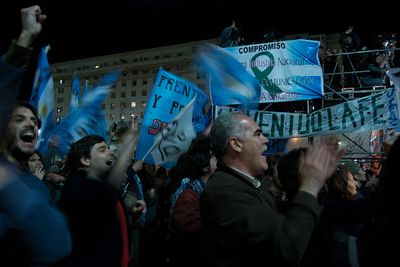The Argentinean Senate approved a new law of audiovisual media, which establishes a new series of rules for the regulation of open signal, cable, and satellite television and radio. In addition, it establishes minimum quotas for the airing of local music and films. The previous order that regulated this market since the last Argentinean dictatorship has been revoked.

Photo of gathering of those that support the new media law by Beatrice Murch and used under a Creative Commons license.
During the debate of the law, there was a lot of controversy going on at the radio and television stations. The main media group in the country, Clarin, which must let go a number of television channels, radio and a percentage of cable subscribers, provided completely negative coverage of the law and other media did the same. However, despite the discussions in the media, there were no massive protests in the streets, which was the scenario that took place during the debate for the raise of agricultural taxes in 2008. In the end, the government achieved an easy victory in the Senate. After December 10, the Congress will be renewed and the current Executive Branch will lose majority in both chambers of Congress.
At the blog Aristotelizar [es], they focus on the proccess of approval of the law in the Congress:
El tratamiento de la ley de medios arroja nuevas luces sobre el modo de gobernar del matrimonio presidencial que continúa erosionando la ya escasa credibilidad de las instituciones. Esta es una ley arcaica que se nutre del ideario del primer peronismo, a pesar de que el mundo ha cambiado y mucho, desde entonces.
At Nanopoder [es] blog, they forecast an extensive series of consequences, all bad, of the application of the law. There are also negative views of the new media law (or its treatment in the Congress, at least) at Un Alumno Diferente [es], El Atrilero [es], and El Observatorio Político [es].
On the side of those who see the approval of this law as something positive, Al Centro y Adentro [es] states:
La instalación del debate sobre una nueva ley de medios audiovisuales en el parlamento tuvo otro efecto en la población. Las franjas más progresistas de la población acompañaron, militándolo, el proyecto de ley que envió el Poder Ejecutivo al Legislativo. Esta vez la centroizquierda y casi todo el campo popular apoyaron la iniciativa del Gobierno (…). Las élites dominantes no pudieron imponer sus intereses particulares (…) en contra de la voluntad general.
More positive texts about this law can be found at Francisco José Bessone's blog [es], Arte y Brujería [es], Sin Zonceras [es], and Fin del Capitalismo ¿Salvaje? [es].
There was a long exchange of opinions at Twitter, which could be followed through the hashtags #leydemedios [es] and #leymedios [es] (media law).







2 comments
“there were no massive protests in the streets”
Which city were you in? Av. 9 de Julio completely shutdown for hours on multiple days over a period of more than a month, same with Av. de Mayo and Callao, and the Plaza del Congreso and de Mayo.
Dan, in which city were you in? The protest in Av 9 de julio and other parts of the city were part of the conflict between industrial workers, labor unions and the Kraft company. It had no relation at all with the media law.
Please, don’t try to misinform people.